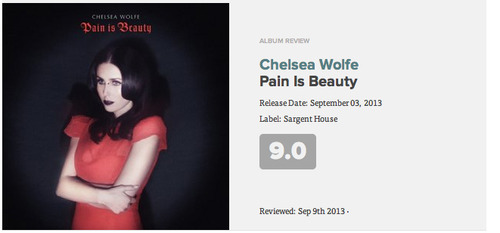Prefix Mag Album Review: Chelsea Wolfe “Pain Is Beauty”
The void is a place you might shy away from. But Chelsea Wolfe lives there, digging for all the melodies in the abyss. After an album she doesn’t want you to remember about was released, Wolfe took years off and redefined her musical career. Releasing The Grime and The Glow in 2010 welcomed a much darker and moodier vibe to a rewarding listen – one of the better and more underappreciated debuts of the past few years. Apokalypsis was an album more people paid attention to, matching more sinister vibes than her previous and reaching further into the heavier melodies. But last year’s Unknown Rooms: A Collection of Acoustic Songs showed Wolfe taking a reserved approach to her content, making tracks like “The Way We Used To” and “Flatlands” shining brightly instead of dimly.
But Pain Is Beauty towers over all of these. Her fourth album is the summation of all efforts and an impressive one at that. It’s emotionally draining and it’s cinematically shocking, at the very least. Conceptually binding an album isn’t such a new thing, but Wolfe does it with justice and with success, and Pain Is Beauty is one of those listens no one can forget. Throughout this album, there are moments of immense, breathtaking intensity worth delving into and revisiting for years to come. Not only is this a particularly great album, Pain Is Beauty is one of the more unique albums you’ll listen to this year.
One characteristic of her earlier albums is the sheer amount of layers of music. Everything is delicately placed on a platter to showcase the right amount of emotion. In many ways, this is a main characteristic of Pain Is Beauty – the tiniest noises bring you further into the mix, noticing its every detail. All of this sits beautifully in the background, with Chelsea Wolfe’s voice – wounded, heartbreaking, and sharp as a knife – leading the song, with her own voice as an instrument. She deliberately affects her voice with pedals – obscuring her own voice in the darkness – and hits high notes with unyielding intensity that pierces your soul.
Wolfe, along with multi-instrumentalist Ben Chisholm, utilized darker synthetic sounds on many tracks, including lead single “The Warden,” which reimagines the ending to George Orwell’s 1984 and touches on one of the larger themes on the album – love. These evocative and urgent sounds are executed much more prominently and successfully than previous efforts, but do not rule the album’s soundscape. Tracks like “We Hit A Wall” and “They’ll Clap When You’re Gone” are sinister doom in music form, with earth-shattering, heavy, thick, and deep guitars that rumble your mind.
Pain Is Beauty is a complex behemoth. It is filled with primal screams, topical journeys, and romantic statements. Rich in musical variety, “Destruction Makes The World Burn Brighter” has a serpentine-like structure, channeling Joy Division to a certain extent. It’s also one of the better song titles in recent memory. Ambient tracks like “Sick” and “Reins” apply repetition to the max, bringing an utmost haunting tone to these two. The last four tracks are truly various. “Ancestors, The Ancients” is a darkly, synthy, and subtle cut, while “They’ll Clap When You’re Gone” pulls out the guitar for a jangly, acoustic tale. This one has Wolfe singing, “When can I die? / When can I go? // When will I be free? / When will I know?” Beyond the stark depressive nature, Wolfe mystically pleads for answers through dazzling chants.
“The Waves Have Come” is the album’s climax, jarringly putting together a tale about a man who’s about to be swallowed in a tsunami. Tapping at virtually two keys on a piano throughout, the track swells and swells until the ultimate crash wipes away everything you’ve heard up to this point, washing away everything you know. This eight-minute goliath is the zenith of the album, flying to all new plateaus seen thus far, with bleeding strings and Wolfe’s vocals delivering heavenly notes above the layers upon layers of instrumentation. The outro has Wolfe crying vocally, “The waves have come and taken you to sea / Never to return to me / Never to return to me / Never to return to me.” Ultimately, the bleak outro of slowly drawing out the climactic finish is a resounding and cleansing feeling. Chelsea Wolfe spoke about Pain Is Beauty, explaining that the album gave a healing impression. “The Waves Have Come” and the defining outro “Lone” wrap up the album to give it a very healing ending, after the onslaught of doom, intensity, and emotion.
Pain Is Beauty shocks. It loudly proclaims its motives from the very start and explores melodies for the duration of the album. Music doesn’t find very many visionaries anymore, and Chelsea Wolfe brands her darkly emotive music as an artistic representation of herself. Sculpting the greatest sum of tracks Wolfe has ever created, Pain Is Beauty, shines in the void that she dwells in. Bleak, distant, polarizing, and beautiful, Wolfe’s fourth album makes a gargantuan impact.
Chelsea Wolfe is currently on tour, check out ArtistData for more information.
Buy/Stream Pain is Beauty on Bandcamp.

